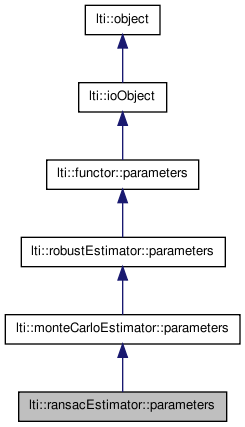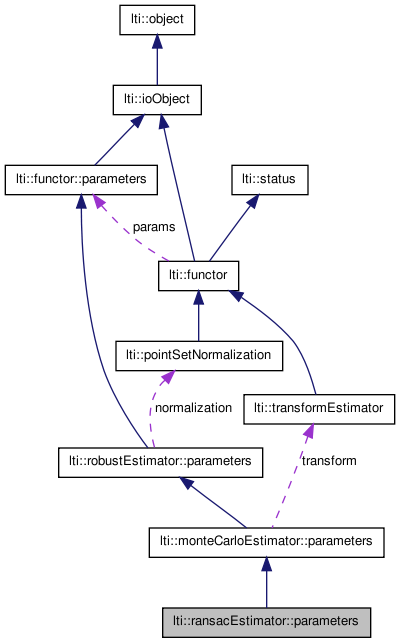

|
latest version v1.9 - last update 10 Apr 2010 |
|
The parameters for the class ransacEstimator. More...
#include <ltiRansacEstimator.h>


Public Member Functions | |
| parameters () | |
| parameters (const parameters &other) | |
| ~parameters () | |
| const char * | getTypeName () const |
| parameters & | copy (const parameters &other) |
| parameters & | operator= (const parameters &other) |
| virtual functor::parameters * | clone () const |
| virtual bool | write (ioHandler &handler, const bool complete=true) const |
| virtual bool | read (ioHandler &handler, const bool complete=true) |
Public Attributes | |
| bool | adaptiveContamination |
| int | numCorrespondencesPerTrial |
| bool | checkStop |
| float | contamination |
| float | confidence |
| bool | useMinCorrespondences |
The parameters for the class ransacEstimator.
| lti::ransacEstimator::parameters::parameters | ( | ) |
Default constructor.
Reimplemented from lti::monteCarloEstimator::parameters.
| lti::ransacEstimator::parameters::parameters | ( | const parameters & | other | ) |
Copy constructor.
| other | the parameters object to be copied |
Reimplemented from lti::monteCarloEstimator::parameters.
| lti::ransacEstimator::parameters::~parameters | ( | ) | [virtual] |
Destructor.
Reimplemented from lti::monteCarloEstimator::parameters.
| virtual functor::parameters* lti::ransacEstimator::parameters::clone | ( | ) | const [virtual] |
Returns a pointer to a clone of the parameters.
Reimplemented from lti::monteCarloEstimator::parameters.
| parameters& lti::ransacEstimator::parameters::copy | ( | const parameters & | other | ) |
Copy the contents of a parameters object.
| other | the parameters object to be copied |
Reimplemented from lti::monteCarloEstimator::parameters.
| const char* lti::ransacEstimator::parameters::getTypeName | ( | ) | const [virtual] |
Returns name of this type.
Reimplemented from lti::monteCarloEstimator::parameters.
| parameters& lti::ransacEstimator::parameters::operator= | ( | const parameters & | other | ) |
Copy the contents of a parameters object.
| other | the parameters object to be copied |
Reimplemented from lti::monteCarloEstimator::parameters.
| virtual bool lti::ransacEstimator::parameters::read | ( | ioHandler & | handler, | |
| const bool | complete = true | |||
| ) | [virtual] |
Read the parameters from the given ioHandler.
| handler | the ioHandler to be used | |
| complete | if true (the default) the enclosing begin/end will be also written, otherwise only the data block will be written. |
Reimplemented from lti::monteCarloEstimator::parameters.
| virtual bool lti::ransacEstimator::parameters::write | ( | ioHandler & | handler, | |
| const bool | complete = true | |||
| ) | const [virtual] |
Write the parameters in the given ioHandler.
| handler | the ioHandler to be used | |
| complete | if true (the default) the enclosing begin/end will be also written, otherwise only the data block will be written. |
Reimplemented from lti::monteCarloEstimator::parameters.
Adjust the degree of contamination after each successfull guess.
The contamination is only decreased and never increased. This parameter effects the number of iterations performed. The functor will always terminate after at most the maximum iterations specified in the parameters, though.
If adaptive contamination is on, the applies return true even if the detected inliers suggest a contamination above the parametrized contamination.
Default: false.
If true the algorithm stops as soon as a transformation is found, whose number of outliers is below the expected contamination.
The expected contamination is supplied as a parameter and not changed adaptively.
Default: true.
The number of trials in adaptive mode depends on the estimated contamination and the confidence, under which the result is correct.
Default: .99
The expected degree of contamination.
Default: .5
The number of correspondences drawn at each trial to estimate the transform.
Literature advises to use the minimum number correspondences that are required which is proved optimal under a statistical context.
Default: true.
If true the minimum required number of points/correspondences is used no matter which value numCorrespondencesPerTrial has.
Default: true.